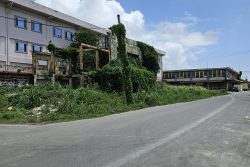Leader of the Opposition Bharrat Jagdeo today called for the urgent restarting of the Amaila Falls Hydropower project and he accused the government of misrepresenting the Norconsult report which was intended to be a facts-based assessment of the project to guide Guyana and Norway.
The statement from the Leader of the Opposition follows:
Government claimed that the recently-released independent assessment of the Amaila Falls Hydropower Project vindicated APNU+AFC’s years of effort to destroy the project. This claim plunges new depths in this Government’s disregard for the truth – in actual fact; the independent assessment urges the Government to re-start AFHP immediately. The PPP calls on all concerned Guyanese to read the assessment for themselves, and to join with the PPP to put pressure on the APNU/AFC Government to quickly re-start the project.
Yesterday, the APNU/AFC Government issued a statement about the recently-released independent assessment of the Amaila Falls Hydropower Project. The assessment was carried out by the internationally reputable consultancy, Norconsult.
The APNU/AFC Government claimed that the Norconsult assessment justified the Government’s efforts to abandon the Amaila Falls Hydropower Project (AFHP). Even by the low standards of APNU/AFC, this plunges new depths in their utter disregard for the truth, and it clearly shows the Government’s contempt for the people of this country. Guyanese families and businesses are still paying way too much for dirty, unreliable electricity, when they should be on the threshold of affordable, clean and reliable electricity. They deserve the truth about Amaila Falls.
We set out below our reaction to the Norconsult assessment – which originated from the Leader of the Opposition Bharrat Jagdeo’s call for a fact-based assessment of AFHP. However, we also urge all patriotic Guyanese to read the assessment and form their own view on what it says. We are confident that intelligent, independent-minded Guyanese will see that the assessment vindicates the project, and supports re-starting it immediately. Contrary to what the APNU/AFC Government has claimed, the Norconsult assessment actually says:
- “The only realistic path for Guyana towards an emission free electricity sector is by delivering its hydropower potential” – page 3
- “The new *APNU/AFC+ Government has confirmed its devotion to the Low Carbon Development Strategy, which was introduced by the former *PPP/C} Government in 2009” – page 3
- “We regard the soundness of AFHP as evident and in order to follow up the intentions of the LCDS as fast as possible, we recommend the preparations for AFHP to be resumed.” – page 38
- “It is our opinion that the BOOT type public-private partnership model should be maintained for the project implementation. An internationally well-merited investor and operator in the hydropower industry should be invited to take the majority position” – page 4
In short: the assessment vindicates the PPP position that Guyana should develop its hydropower capacity and that AFHP should be the first hydropower project to be developed.
Crucially, it reaffirms that the BOOT type public-private partnership model – which the then APNU+AFC Opposition destroyed in August 2013 – is the right financial structure for AFHP.
Up until yesterday, APNU+AFC, first in Opposition and then in Government, claimed that their concerns with the project related to the financing costs which are associated with this BOOT type of partnership. They made wild claims about the cost of the project and the resulting cost of electricity, and repeated the ridiculous claim that the project would saddle Guyanese with decades of debt. They also claimed that the EPC contracts had been awarded through closed, corrupt practices.
However, in yesterday’s statement, they did not mention these concerns at all – because they have been thoroughly debunked by Norconsult. The independent assessment says:
- “After competitive bidding between five pre-qualified candidates, AFHI in 2008 selected China Rail First Group (CRFG) as EPC Contractor.” – page 12
- “Constructing Amaila Falls would cut electricity costs by more than 50% for the energy produced by AFHP, or US$3,3 billion over 20 years” – page 32
In their statement yesterday, APNU+AFC hid how they are no longer making claims about the financial model by instead claiming that there were mission-critical engineering issues to be solved. This is not true – the Norconsult report sets out some design areas for consideration as the project progresses, but also notes that these areas were already being looked at. Norconsult clearly states “Although certain design aspects of AFHP should be reviewed and revised, we regard the soundness of AFHP as evident and in order to follow up the intentions of the LCDS as fast as possible, we recommend the preparation for AFHP be resumed” – page 38.
Instead of focusing on these engineering issues, APNU+AFC should have looked at areas where the project’s financing can be improved – the Norconsult assessment sets out several sensible recommendations which deserve further discussion and analysis. The PPP does not agree with all of these recommendations, but will support any efforts go get costs down further if possible. Specifically, the assessment sets out several recommendations to reduce costs from c. US$858 million to US$801 million – on page 33. These reductions come from three places:
- US$20 million of the reduction relates to taking the cost of the access road out from the project, given that the road is already constructed. This is a sensible reflection of reality, although it does not mean that US$20 million has been saved, only that it has been invested already.
- Further reductions are based on the new private investor securing a return of 17% instead of a return of 19% on equity investment – the PPP believes this to be sensible as it is in line with where the PPP expected the final position to be on AFHP back in 2013. It is also in line with global benchmarks for this type of capital being invested in markets similar to Guyana.
- The rest of the reductions are based on assumptions that some financing can be achieved at slightly lower interest rates in the capital markets or by increasing the repayment period for some borrowing. The PPP believes that these financing reductions are not likely to be achievable for Guyana, but supports testing the capital markets to see if better rates can be achieved.
There are also several other areas where the assessment could encourage discussion on improving the project. For example, on page 32, the assessment also states that “the original PPA had a risk allocation which was not well balanced”. We agree with this statement, but point out that this risk allocation was already being improved when the project was put at risk by APNU+AFC. Regardless, we believe that an updated discussion about realistic risk allocation should be taking place as part of advancing the project today.
However, it is important to re-emphasise that even with the original financing structure, AFHP would have delivered more electricity for less money than today, avoided any public debt for Guyana, and reintroduced Guyana to the global capital markets for the first time in 40 years. Any marginal improvements that can be achieved now are dwarfed by the losses incurred by Guyana because of APNU+AFC’s actions since August 2013.
To try and repair the damage, Norconsult sets out how AFHP can be operational in six and a half years time – mainly because the original tenders date from 2008 and now need to be re-tendered.
This is six years too late because AFHP should have been providing affordable, reliable, clean energy to Guyanese within the next few months. However, given that the wasted time cannot be re-gained, we must focus on the future.
The PPP wishes to see AFHP re-start immediately, and is willing to engage in discussions on all the recommendations set out in the Norconsult assessment. With that in mind, the PPP calls on all Guyanese to join with us in ensuring that the APNU/AFC Government acts in the interest of the people of Guyana, apologises for their repeated lies about the project and instead works to make AFHP a success.









